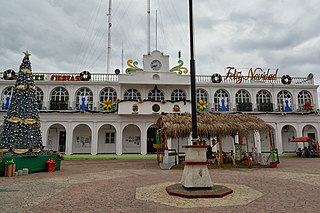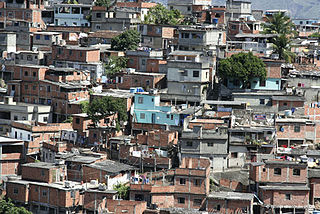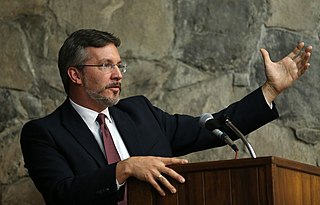
Grupo Bimbo, S.A.B. de C.V. is a Mexican multinational food company with a presence in over 33 countries located in the Americas, Europe, Asia and Africa. It has an annual sales volume of 15 billion dollars and is listed on the Mexican Stock Exchange with the ticker BIMBO.

Ocosingo is a city and its surrounding municipality of the same name in the Mexican state of Chiapas.

Crime is one of the most urgent concerns facing Mexico, as Mexican drug trafficking rings play a major role in the flow of cocaine, methamphetamine, fentanyl, heroin, and marijuana transiting between Latin America and the United States. Drug trafficking has led to corruption, which has had a deleterious effect on Mexico's Federal Representative Republic. Drug trafficking and organized crime have been a major source of violent crime. Drug cartels and gangs have also branched out to conduct alternative illegal activities for profit, including sex trafficking in Mexico. Some of the most increasingly violent states in Mexico in 2020 included Guanajuato, Zacatecas, Michoacán, Jalisco, and Querétaro. Some of the world's most violent cities are reportedly within the state of Guanajuato with extortion from criminal groups now being commonplace. The state of Zacatecas is said to be valuable to multiple organized crime groups for drug trafficking, specifically methamphetamine to the United States. As of 2021, Michoacán is experiencing increased instances of extortion and kidnapping due to a growing presence and escalation in the armed conflicts between CJNG and Cárteles Unidos on regions bordering the neighboring state of Jalisco. CJNG is also currently battling the Los Chapitos faction of the Sinaloa Cartel in the North Mexican region of Sonora.

Mexico has approximately 81 million Internet users representing 70.1% of the population. The country ranks 10 in number of Internet users in the world. Mexico is the country with the most Internet users among Spanish speaking countries and is currently experiencing a huge surge in demand for broadband Internet services. In August 2005, Cisco Systems, said they see Mexico and countries in Latin America as the focal point for growth in coming years. With Mexico being identified as a hypergrowth market for equipment suppliers and receiving the biggest chunk of Cisco's investments. Additionally looking at the historical growth for the period from 2001 to 2005 we see broadband Internet jump from 0.1 subscribers per hundred population to 2.2 subscribers per hundred population, a growth of 2100% in just five years.

Brazil ranks 49.3 in the Gini coefficient index, with the richest 10% of Brazilians earning 43% of the nation's income, the poorest 34% earn less than 1.2%.

John Mill Ackerman Rose is an American-born, naturalized Mexican political activist, TV host, and academic at UNAM.

Arturo Fernando Zaldívar Lelo de Larrea is a Mexican lawyer who has been a member of the Supreme Court of Justice of the Nation since December 2009. Zaldívar served as President of the Court from 2 January 2019, to 1 January 2023.

The Association for a More Just Society is a non-governmental organization working on human rights and government transparency in Honduras, where it serves as Transparency International's local chapter. Since its founding in Honduras in 1998, ASJ has promoted peace and justice in Honduras by advocating for government systems that work for the most vulnerable members of society.
The Movement for Peace with Justice and Dignity (MPJD) is an ongoing protest movement that began on 28 March 2011 in response to the Mexican Drug War, government and corporate corruption, regressive economic policies, and growing economic inequality and poverty. The protests were called by Mexican poet Javier Sicilia in response to the death of his son in Cuernavaca. The protesters have called for an end to the Drug War, the legalization of drugs, and the removal of then-President of Mexico Felipe Calderón. Protests have occurred in over 40 Mexican cities, including an estimated 50,000 in Cuernavaca and 20,000 in Mexico City.

Canal 5 is a Mexican free-to-air television network owned by TelevisaUnivision. It traces its origins to the foundation of Channel 5 in Mexico City in 1952. Canal 5's program lineup is generally targeted at a younger audience and includes cartoons, foreign series and movies, along with a limited number of sporting events such as NFL games, boxing, the FIFA World Cup and, historically, the Olympic Games.
The Supreme Court of Justice is the highest court of ordinary jurisdiction in Bolivia, based in Sucre. Its powers are set out in Articles 181–185 of the 2009 Constitution and the Law of the Judicial Organ. It was first seated on 2 January 2012.
Marco Antonio Ávila Garcia, a Mexican crime reporter for Diario Sonora de la Tarde in Ciudad Obregón and El Regional de Sonora newspapers in Sonora state, Mexico. He was abducted in Ciudad Obregón and tortured to death by a drug cartel and left on the side of the road near Empalme, which is also in Sonora. Garcia was the fifth journalist killed in 2012 in Mexico, which has become one of the most dangerous countries for journalists, and his murder preceded the 1 July 2012 Mexican elections, in which drug violence had become a major issue.

Cristián Alberto López Bello was a crime journalist for the Mexican newspaper El Imparcial and the radio show "Foro Político", in Oaxaca, Mexico. The murder of López was an early case that tested the new powers of federal special prosecutors to investigate crimes against Mexican journalists and freedom of expression. The federal special prosecutor, however, deferred to the Attorney General of Oaxaca, who said three and a half months after the López murder that the motive was a bar fight, announced the arrest of four people, and then resigned the next day. The family publicly disagreed with the official conclusion.
Violence against women in Mexico includes different forms of gender-based violence. It may consist of emotional, physical, sexual, and/or mental abuse. The United Nations (UN) has rated Mexico as one of the most violent countries for women in the world. According to the National Institute of Statistics and Geography in Mexico (INEGI), 66.1 percent of all women ages 15 and older have experienced some kind of violence in their lives. Forty-nine percent have suffered from emotional violence; 29 percent have suffered from emotional-patrimonial violence or discrimination; 34 percent from physical violence; and 41.3 percent of women have suffered from sexual violence. Of the women who were assaulted in some form from 2015 to 2018, 93.7 percent of them did not seek help or report their attacks to authorities.
César Emiliano Hernández Ochoa is a Mexican public official, lawyer and academic from Durango, Mexico. Hernández has a long trajectory inside the Mexican government, having worked in every Mexican federal administration since Ernesto Zedillo and received presidential appointments both from Andrés Manuel López Obrador and Enrique Peña Nieto. From December 1, 2018, until May 15, 2020, he served as National Commissioner at the Commission for Better Regulation. From February 5, 2014, until November 21, 2017, he served as Deputy Secretary of Energy for Electricity at Mexico's Department of Energy.

Jesús Adrián Rodríguez Samaniego was a Mexican radio journalist for the Antena 102.5 FM and a former crime reporter for the Organización Editorial Mexicana newspaper El Heraldo de Chihuahua, was murdered on December 10, 2016, in Chihuahua City, Chihuahua, Mexico. Reporters stated a possible motive for the murder may have been Rodríguez's investigation into the 2013 jailing of two brothers from the northern Mexican state of Sinaloa. This case was the 11th murder in Mexico of a journalist in 2016, the year with the highest number recorded.

An antimonumenta was installed in front of the Palace of Fine Arts, in Mexico City on 8 March 2019, the date commemorating International Women's Day, during the annual march of women protesting against gender violence.
The Battle of Doctor Coss was an armed conflict in Mexico between the Gulf Cartel and the Los Zetas-Northeast Cartel in the municipality of Doctor Coss, Nuevo León. The confrontation was one of the most serious in the region, disputed by both cartels due to their proximity to border municipalities of the neighboring state of Tamaulipas.

Marco Feoli Villalobos is a Costa Rican lawyer and university professor, and currently a member of the Subcommittee for the Prevention of Torture at the United Nations. Feoli was previously the Vice Minister of Justice and Peace of Costa Rica during the government of President Luis Guillermo Solís. Feoli is the third Costa Rican to serve on the subcommittee. He is also a university professor at the National University of Costa Rica.












